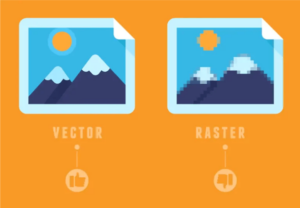Vector art’s unparalleled scalability ensures crisp, clean lines and flawless graphics at any size, making it an ideal choice for screen printing and promotional materials. Its precision and editability offer a level of professionalism that raster images simply cannot match, solidifying vector graphics as the gold standard in the industry.

Why Vector Art is the Optimal Choice for Screen Printing and Promotional Products
In the realms of screen printing and creating promotional products, the choice of artwork format plays a pivotal role in determining the quality, efficiency, and impact of the finished product. Among the various formats available, vector art emerges as the superior choice for several compelling reasons. This blog will delve into the world of vector graphics, exploring why it stands out as the best option for screen printing and promotional products.
Understanding Vector Art
Before we delve into the advantages of vector art in screen printing and promotional products, it’s crucial to understand what vector art is. Vector artwork is created using vector graphics, which are composed of points, lines, curves, and shapes based on mathematical formulas. This fundamental difference in creation and structure sets vector graphics apart from their raster (or bitmap) counterparts, which are made up of pixels.
The Scalability Advantage
One of the most significant benefits of vector art is its scalability. When you scale a vector image file, there is no loss of resolution or quality. This is because the mathematical formulas that constitute the vector graphics recalculate when resized, ensuring the image retains its clarity and crispness at any size. This attribute is particularly important in screen printing and promotional products for several reasons:
- Versatility in Size Adjustments: Products and prints come in various sizes, and the need to adjust the artwork without compromising quality is paramount. Whether you’re printing a small logo on a pen or a large design on a banner, vector art ensures that the image remains sharp and clear.
- Consistency Across Different Media: Promotional campaigns often require branding across multiple platforms and products. Vector art ensures that your brand’s logo or design maintains consistency, whether it’s on a business card, a t-shirt, or a billboard.
Precision and Clean Lines
Another area where vector art excels is in its precision and the cleanliness of lines it produces. Since vector graphics are made up of clear-cut lines and curves defined by mathematical equations, they produce extremely sharp and clean images. This precision is vital in screen printing and promotional products for several reasons:
- Clarity of Details: Fine details and small text remain readable and sharp, which is essential for branding and conveying messages effectively.
- Neat and Professional Finish: The clean lines and sharp edges that vector graphics provide result in a more professional and polished final product, enhancing the perceived value of the promotional item or print.
Ease of Editing and Color Control
Vector art is not only scalable and precise but also highly editable. This flexibility is a significant advantage when designing for screen printing and promotional products:
- Easy Modifications: Designs often undergo several iterations before finalization. Vector graphics can be easily modified without losing quality, making the design process more efficient.
- Color Adjustments: Screen printing often involves specific color requirements. Vector art allows for easy color manipulation, ensuring that the colors used are exact and consistent.
Cost-Effective and Time-Efficient Production
The production process in screen printing and making promotional products can be complex and time-consuming. Vector art simplifies and streamlines this process:
- Faster Processing Time: Vector files are generally smaller and less complex than high-resolution raster images, leading to quicker processing times in printing software.
- Reduced Errors and Waste: The precision and clarity of vector art reduce the likelihood of errors during the production process, resulting in less waste and cost savings.
Broad Compatibility and Industry Standards
Vector art is widely supported across various software and printing technologies. Its compatibility makes it a preferred choice in the industry:
- Software Compatibility: Vector files are compatible with most graphic design and printing software, making them a versatile choice for designers and printers.
- Industry Standard: In many areas of graphic design, especially in screen printing and promotional products, vector art is the industry standard due to its scalability and quality.
Sustainability and Environmental Considerations
In today’s world, environmental considerations are increasingly important. Vector art contributes to sustainability in the production process:
- Less Ink Usage: The precision of vector art often requires less ink compared to raster images, which can be beneficial for the environment and reduce costs.
- Efficient Production: The efficiency and reduced error rate in using vector graphics mean less waste in materials, contributing to more sustainable production practices.
Real-World Applications and Case Studies
To illustrate the effectiveness of vector art in screen printing and promotional products, let’s look at some real-world examples and case studies:
- Corporate Branding: A company launching a new product line uses vector logos across various promotional materials, maintaining brand consistency and quality.
- Event Merchandising: For a large music festival, organizers use vector art for all merchandise, ensuring that products ranging from small badges to large banners have consistent and high-quality graphics.
- Custom Apparel: A custom apparel business uses vector graphics to ensure that designs on t-shirts and hats remain sharp and clear, regardless of size variations.
In conclusion, vector art is the optimal choice for screen printing and promotional products due to its scalability, precision, ease of editing, cost-effectiveness, broad compatibility, and contribution to sustainability. Its ability to maintain quality across various sizes and mediums makes it an indispensable tool in the world of graphic design and printing. As technology and design practices evolve, the relevance and importance of vector art in these fields are only set to increase, solidifying its position as the preferred choice for professionals and businesses alike.
